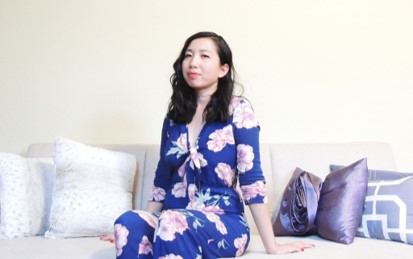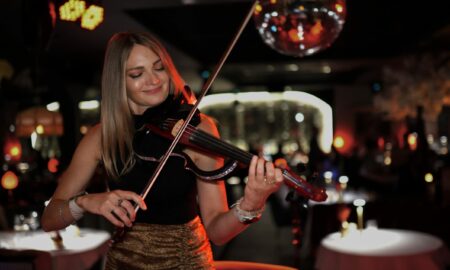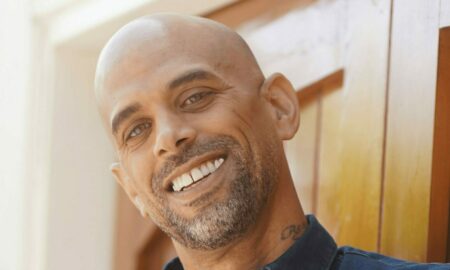

Today we’d like to introduce you to Muriel Leung.
Muriel, let’s start with your story. We’d love to hear how you got started and how the journey has been so far.
I’ve always written either in my head or on paper for as long as I can remember. My mother tells me she used to watch me examine the folds and lines of my hands for hours, and I imagine that during those moments, I am writing a type of poem too.
When I started winning writing contests in high school, my mother took me to a local bank where I opened my first savings account and deposited my contest winnings there. I learned from that experience that art has a legitimate place in my life and felt it can be something worth pursuing with seriousness.
In college, I studied with Asian American creative writing teachers for the first time, which completely opened me up to new ways of thinking about my experiences as a Chinese American woman, especially how I write about myself, my family, and my community in my poetry. Writing a book seemed like such a far-fetched idea at the time, so I spent the first few years after college working many jobs that include becoming a teaching artist, a crisis counselor, youth worker, arts administrator, and more. I didn’t write much during those years, unsure of how my writing could reflect the work that I did in my everyday life, which seemed more pressing and to more directly address social injustices.
It was not until I was accepted to Kundiman, a literary organization that works to support Asian American writers, that I found a community of writers whose advice, kindness, and support buoyed me in these next few years through the earliest iterations of my first poetic manuscript, an MFA program in Creative Writing, and now, a doctoral program. The writers in Kundiman were the first readers of my work. We sat around kitchen tables, swapping meals, stories, and survival tips for graduate school as a person of color enduring racism, misogyny, and the assorted violence in academic spaces. It was their support that gave me the courage to send my work out for publication.
I started to send my poetry manuscript, Bone Confetti to book contests while I was in my MFA program. It was a semi-finalist and finalist in several contests before I got the call from Carmen Gimenez-Smith, the amazing publisher of Noemi Press, that my manuscript was selected as the winner of the 2015 Noemi Press book prize. I remember getting that call after a long run and I started to cry in my car, elated by the news. I apologized to Carmen for being both sweaty and sappy, and when we got off the phone with each other, I called my mother immediately to let her know the news. My mother had known that I had been writing and publishing and that I was attending graduate school for these aims as well, but the book meant something to her—a contained object of work in the world, something she could hold in her hand and share. That means so much to me.
Has it been a smooth road?
One of the greatest challenges of being a queer Chinese American woman writer and academic is trying to be both within academia, which often means navigating the institutional harms that disproportionately affect not only me but also those whose positions are more vulnerable than mine. For me, I know I have endured sexual harassment, inappropriate behavior by tenured faculty, and the daily racist, sexist and homophobic actions of colleagues in academic spaces. There is the assumption that as an Asian woman, I must move in a quiet and docile manner, and that I would submit easily to others. I think people are generally startled when they encounter me. While I don’t move loudly through the world, I do believe in having convictions while also being open to critique and change. I think people assume that Asian women are rigid, unfeeling, and without distinct character, so when I do offer up an opinion and raise it with firm consideration of where my intentions are coming from, it almost always feels unprecedented.
Sometimes these challenges get in the way of doing both the creative and scholarly work. If you can imagine having to confront the scrutiny of people who wield power over your future as well as the lack of support from some peers on a daily basis, this can really wear on a person. Thankfully, these days, I feel like I have learned how to navigate academic spaces in such a way that I can make the most of my time, to do the work that feels important to me, and to think about what it means to do with integrity.
I feel most empowered when I find that my personal struggles are interconnected with greater community concerns. I’ve learned that the disconcerting experiences I have do not belong to me alone but are part of greater systemic issues. Once I understood where my experiences were situated alongside others, I saw myself as part of a larger collective vision for change. I organize with the Graduate Student Organizing Committee, which is affiliated with SEIU 721. We are a group of graduate student organizers who are invested in fighting for improved conditions for USC graduate students in a political climate that has become increasingly hostile towards graduate student labor. Being part of these organizing efforts has been such a transformative way of thinking about my role as a writer, scholar, and member of the academic community.
So, as you know, we’re impressed with Miresa Collective – tell our readers more, for example what you’re most proud of and what sets you apart from others.
I am a multi-genre and multimedia writer, scholar, editor, and literary organizer. While I wear a lot of hats, I am first and foremost a graduate student at University of Southern California’s doctoral program in Creative Writing and Literature. In my creative work, I believe in the blurring of genres, testing the boundaries of where one thinks poetry begins and prose ends. I also make work with illustrations and digital media, which includes video poetry and playing with hypertext through interactive digital storytelling platforms. Currently, I am working on my second poetry book as well as a linked short story collection.
In addition to my creative work, I am also a poetry editor at Apogee Journal, a literary journal that uplifts the voices of marginalized writers and artists. I also co-host The Blood-Jet Writing Hour podcast with Rachelle Cruz and MT Vallarta where we interview writers and artists whose work we feel are making significant social and political impact in the world.
Several Los Angeles-based writers of color, Xochitl-Julisa Bermejo, Vickie Vertiz, Kenji Liu, Soraya Membreno, Douglas F. Brown, and I recently formed Miresa Collective, a feminist speakers’ bureau that offers readings, performances, workshops, lectures, and other events exploring the intersections of arts and politics. This speakers’ bureau emerged out of several ongoing conversations about what it would mean to form a writers and artists union where we could advocate for each other for just compensation for our artistic labor and share resources. Across different hand-pulled noodle restaurants and dim sum places in the San Gabriel Valley and greater Los Angeles area, we ate and talked about what an arts and literary community should do for one another. We decided to form Miresa Collective to begin testing out a workers’ cooperative model of resource and skill sharing, to support each other in our art and literary careers, and to commit to making work that has deep social impact. We hold each other accountable to these practices.
Let’s touch on your thoughts about our city – what do you like the most and least?
I love the rich arts and cultural life in Los Angeles! I was very fortunate to be dropped into an arts and literary community when I first moved to the city. It was at a potluck and reading salon hosted by Kundiman at Kaya Press publisher, Sunyoung Park’s house that I met the writers who would become a core part of the following years in Los Angeles. These are the writers that would eventually come to form Miresa Collective, a feminist speakers’ bureau. Before then, we were just hungry souls called to the many delicious offerings in the San Gabriel Valley. We called ourselves the SGV Food Club first, coordinating monthly meetups at restaurants to sometimes talk about art and writing and sometimes just eating together without much shop talk at all.
As much as I love this opportunity to eat and grow an arts and literary life with people in Los Angeles, I wish I knew how to interpret its multi-tiered parking signs.
Contact Info:
- Website: www.murielleung.com
- Email: [email protected]
- Instagram: www.instagram.com/murmurshewrote
- Twitter: www.twitter.com/murmurshewrote
- Other: www.miresacollective.com





Image Credit:
Katie Willingham, Addie Tsai
Suggest a story: VoyageLA is built on recommendations from the community; it’s how we uncover hidden gems, so if you or someone you know deserves recognition please let us know here.



















